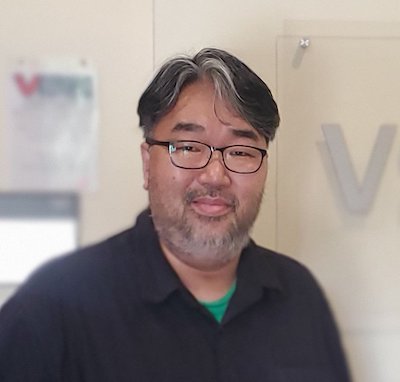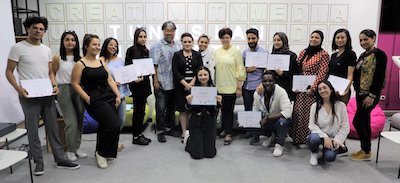In This Story

Sang Nam, the director of Computer Game Design Program in George Mason University’s College of Visual and Performing Arts, doesn’t just make games for entertainment, he’s on a mission to make a difference.
Nam has been selected as a Fulbright Specialist Scholar, which lasts for four years.
Ying-Ying Kuo, a fellow Fulbright Specialist and a former Mason instructional designer and learning analyst, thought Nam would be a perfect candidate when asked to recommend someone for the assignment.
"I referred Sang to the Fulbright Specialist program because he was the best person to conduct this project,” said Kuo. Nam applied specifically for the assignment in Tunisia, for which he was selected.
He has been working with game designers and developers in Tunis, Tunisia. The organization that hosted Nam is Tunis International Center for Digital Cultural Economy (TICDCE), under the Ministry of Culture in Tunisia.
“They are game designers and developers in Tunisia, but the whole country is starting in this industry,” said Nam.
Nam’s visit to Tunis consists of two trips, the first of which was in late May.
“I ran a two-week long workshop on game design and development, and the implication of virtual reality,” said Nam.

He returns in September to help designers create a virtual reality game focused on the historical site Dar Sebastian, often called the Hammamet Cultural Centre. Nam and the workshop participants visited the historical site to see what they could do to highlight those places using game design.
“It will be educational for youth in Tunisia who play this virtual reality game while walking around this building and learning about their culture,” said Nam.
His work overseas mirrors the work he’s doing with his students at Mason, which includes upcoming projects that focus on concepts such as Serious Games and digital therapeutics.
“Serious Games are not for pure entertainment, but games with serious purposes such as education, simulation, defense, and more,” he said.
The concept of Serious Games can be applied to potential solutions for problems normally approached by other disciplines. This process, Nam said, is called “gamification.”
This is no easy feat, Nam said, but “we want our students to be creative problem solvers. While making a game from scratch, they have to overcome many things. To gamify is to basically use well-working game mechanics and learning why it works or makes the games so engaging. We try to use those mechanics in real life.”
Mason’s Virginia Serious Game Institute (VSGI) will host the international symposium on DTx, digital therapeutics, sponsored by NCSoft, one of the biggest game companies in Korea with Mason Korea. The event will take place at Mason Square (formerly Arlington Campus) on November 9.
Nam describes digital therapeutics as apps or games that can be used for medicinal purposes. “There are prescribed games for ADHD, pain management, and for people’s well-being,” he said.
Nam is working on a grant proposal for the National Cancer Institute in hopes of implementing a new pain management remedy for late-stage cancer patients, which will also lessen the use of pain medication.
“What I, and many game design developers believe, is that sometimes it’s better for a patient to play a virtual reality game in an immersive and engaging setting to ease the pain a little bit,” he said.
He compares these gamified solutions to that of the Metaverse, which simulates real-life structures.
“There are many ways for us to use games to make this world better.”
